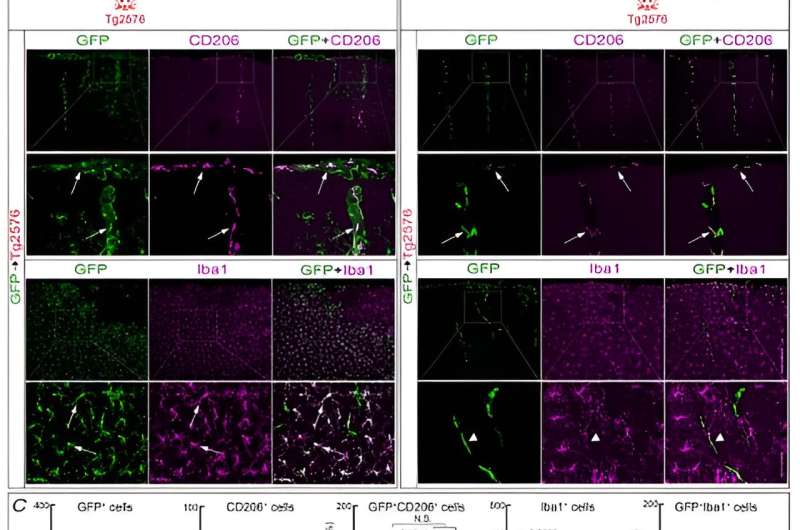This article has been reviewed according to Science X's editorial process and policies. Editors have highlighted the following attributes while ensuring the content's credibility:
fact-checked
peer-reviewed publication
trusted source
proofread
Team finds new culprit in amyloid beta buildup and neurodegeneration

Researchers at Weill Cornell Medicine have demonstrated how amyloid beta, a peptide associated with Alzheimer's disease, can interact with a protein receptor on immune cells in the brain. This triggers a reaction that damages blood vessels and causes neurodegeneration.
The findings, published Oct. 3 in Molecular Neurodegeneration, may help researchers understand how dementia develops in diseases such as Alzheimer's and cerebral amyloid angiopathy (CAA), which often coexist, and discover much-needed treatments.
Amyloid beta is a normal peptide byproduct of brain function, but in CAA and Alzheimer's, these small molecules build up and damage the walls of blood vessels in the brain. The injured arteries can cause brain bleeds and contribute to cognitive impairment, but the mechanism of how this happens has been unknown.
Previous studies have shown border-associated macrophages—immune cells that surround blood vessels in the brain—have CD36 receptors on their surface that can bind to amyloid beta. It turns out that amyloid beta activates CD36, triggering the release of oxygen free radicals, which damage arterial walls and suppress necessary blood flow in the brain.
"The brain normally removes amyloid beta very efficiently because our blood vessels help pump it out of the brain to stay healthy. But we found when amyloid beta accumulates, it 'tickles' border-associated macrophages, which release large amounts of toxic free radicals," said study senior author Dr. Costantino Iadecola, director and chair of the Feil Family Brain and Mind Research Institute and the Anne Parrish Titzell Professor of Neurology at Weill Cornell Medicine.
The researchers found that the free radicals paralyze blood vessels in the brain.
"Amyloid then accumulates in the smooth muscle of the vessel walls, which blocks the vessel's ability to pump blood to the brain," Iadecola said. "CAA and cognitive impairment are the unfortunate result."
The study team also included co-corresponding author Laibaik Park, associate professor of neuroscience at the Feil Family Brain and Mind Research Institute, and first author Dr. Ken Uekawa, who was a visiting fellow at Weill Cornell Medicine during this research.
Starting with a preclinical model of Alzheimer's disease with CAA and cognitive impairment, the researchers eradicated CD36 in the border-associated macrophages.
"We showed that eliminating CD36 receptors in border-associated macrophages improved vascular function and reduced amyloid beta accumulation around blood vessels. Most importantly, the cognitive function of the mice improved," Park said.
The researchers also found that without CD36, the macrophages produced less reactive oxygen radicals.
These findings demonstrate a new role for border-associated macrophages in cognitive decline: Amyloid beta induced production of oxygen free radicals, which damages arteries, causes beta amyloid deposits in the arterial walls and cognitive decline. Iadecola and his colleagues concluded that deleting CD36 in border-associated macrophages suppressed oxidative stress, improved neurovascular function and promoted amyloid beta clearance out of the brain, so it didn't injure arteries.
Therefore, targeting CD36 in border-associated macrophages may benefit CAA and other conditions associated with amyloid accumulation on blood vessels. For instance, the researchers speculate that this finding may help find a treatment for amyloid-related imaging abnormalities (ARIA). This is a potentially serious reaction to monoclonal antibody drugs, like aducanumab, used to treat patients with mild cognitive impairment and Alzheimer's disease.
In a large proportion of patients receiving this amyloid beta immunotherapy at the highest dose, MRIs show that brain edema or hemorrhages occurred since starting treatment. Currently, these patients must discontinue the drug, but counteracting ARIA may enhance the success of amyloid beta immunotherapy.
Iadecola concluded, "After completing our translational work in the coming years, we hope to determine if blocking CD36 in brain macrophages or otherwise manipulating them could eliminate abnormal accumulations of amyloid beta in patients treated with amyloid beta immunotherapy."
More information: Ken Uekawa et al, Border-associated macrophages promote cerebral amyloid angiopathy and cognitive impairment through vascular oxidative stress, Molecular Neurodegeneration (2023). DOI: 10.1186/s13024-023-00660-1





















